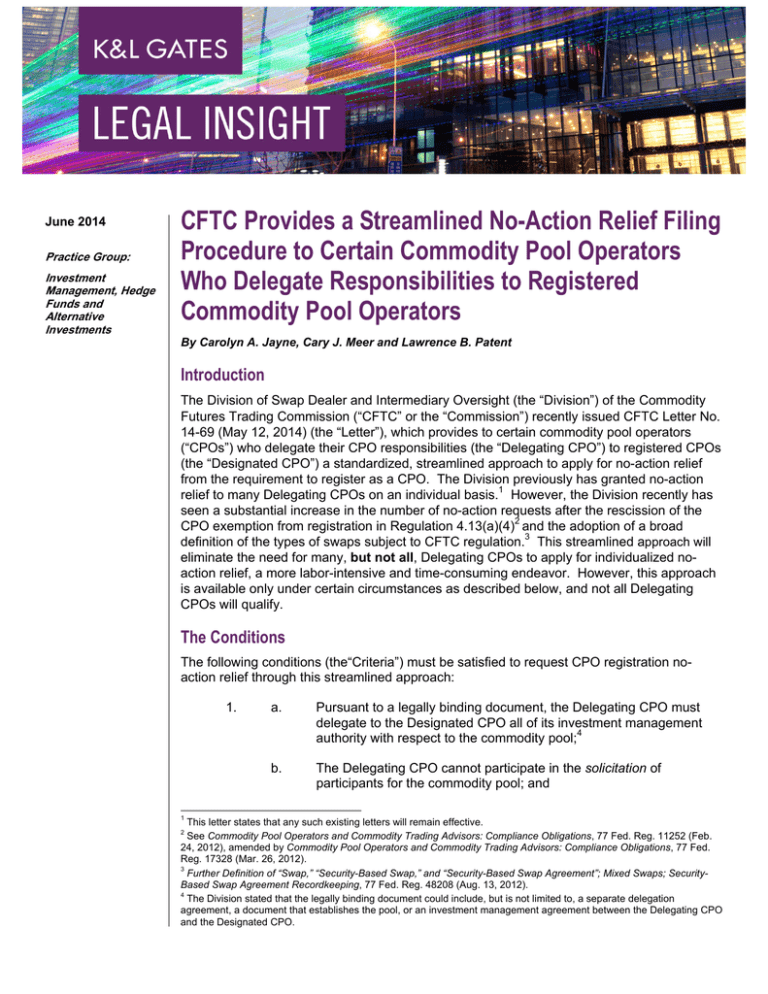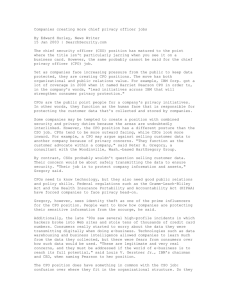CFTC Provides a Streamlined No-Action Relief Filing
advertisement

June 2014 Practice Group: Investment Management, Hedge Funds and Alternative Investments CFTC Provides a Streamlined No-Action Relief Filing Procedure to Certain Commodity Pool Operators Who Delegate Responsibilities to Registered Commodity Pool Operators By Carolyn A. Jayne, Cary J. Meer and Lawrence B. Patent Introduction The Division of Swap Dealer and Intermediary Oversight (the “Division”) of the Commodity Futures Trading Commission (“CFTC” or the “Commission”) recently issued CFTC Letter No. 14-69 (May 12, 2014) (the “Letter”), which provides to certain commodity pool operators (“CPOs”) who delegate their CPO responsibilities (the “Delegating CPO”) to registered CPOs (the “Designated CPO”) a standardized, streamlined approach to apply for no-action relief from the requirement to register as a CPO. The Division previously has granted no-action relief to many Delegating CPOs on an individual basis.1 However, the Division recently has seen a substantial increase in the number of no-action requests after the rescission of the CPO exemption from registration in Regulation 4.13(a)(4)2 and the adoption of a broad definition of the types of swaps subject to CFTC regulation.3 This streamlined approach will eliminate the need for many, but not all, Delegating CPOs to apply for individualized noaction relief, a more labor-intensive and time-consuming endeavor. However, this approach is available only under certain circumstances as described below, and not all Delegating CPOs will qualify. The Conditions The following conditions (the“Criteria”) must be satisfied to request CPO registration noaction relief through this streamlined approach: 1. 1 a. Pursuant to a legally binding document, the Delegating CPO must delegate to the Designated CPO all of its investment management authority with respect to the commodity pool;4 b. The Delegating CPO cannot participate in the solicitation of participants for the commodity pool; and This letter states that any such existing letters will remain effective. See Commodity Pool Operators and Commodity Trading Advisors: Compliance Obligations, 77 Fed. Reg. 11252 (Feb. 24, 2012), amended by Commodity Pool Operators and Commodity Trading Advisors: Compliance Obligations, 77 Fed. Reg. 17328 (Mar. 26, 2012). 3 Further Definition of “Swap,” “Security-Based Swap,” and “Security-Based Swap Agreement”; Mixed Swaps; SecurityBased Swap Agreement Recordkeeping, 77 Fed. Reg. 48208 (Aug. 13, 2012). 4 The Division stated that the legally binding document could include, but is not limited to, a separate delegation agreement, a document that establishes the pool, or an investment management agreement between the Delegating CPO and the Designated CPO. 2 CFTC Provides Streamlined No-Action Relief Filing Procedure to Certain Commodity Pool Operators Who Delegate Responsibilities to Registered Commodity Pool Operator c. The Delegating CPO cannot manage any property of the commodity pool. 2. The Designated CPO must be registered as a CPO. 3. The Delegating CPO must not be subject to a statutory disqualification under Section 8a(2) or 8a(3) of the Commodity Exchange Act (the “CEA”). 4. There must be a business purpose for the Designated CPO being a separate entity from the Delegating CPO that is not solely to avoid registration by the Delegating CPO under the CEA and the Commission’s regulations.5 5. The books and records of the Delegating CPO with respect to the commodity pool must be maintained by the Designated CPO in accordance with Regulation 1.31, the regulation setting forth general requirements for all books and records required to be kept under the CEA and regulations thereunder. 6. If the Delegating CPO and the Designated CPO are each a non-natural person, then one such CPO must control, be controlled by, or be under common control with the other CPO. 7. If a Delegating CPO is a non-natural person, then such Delegating CPO and the Designated CPO must have executed a legally binding document whereby each undertakes to be jointly and severally liable for any violation of the CEA or the Commission’s regulations by the other in connection with the operation of the commodity pool. 8. If a Delegating CPO is a natural person and is not an Unaffiliated Board Member, as defined below, then such Delegating CPO and Designated CPO must have executed a legally binding document whereby each undertakes to be jointly and severally liable for any violation of the CEA or the Commission’s regulations by the other in connection with the operation of the commodity pool. 9. If a Delegating CPO is an Unaffiliated Board Member, then such Delegating CPO must be subject to liability as a board member in accordance with the laws under which the commodity pool is established. Analysis and Limitations of this Relief The Division intended this relief to apply to certain fact patterns that it encounters regularly in no-action requests. For example, one condition to qualify to use this approach is that, if the Delegating CPO and Designated CPO are each non-natural persons, then one such CPO controls, is controlled by, or is under common control with the other CPO. Many pools utilize separate but affiliated investment advisers and general partners or managing members and 5 Some reasons that the Division referred to in the Letter include for separate asset management purposes, tax-related reasons, to account for different ownership and compensation arrangements, or to comply with licensing requirements in other jurisdictions. 2 CFTC Provides Streamlined No-Action Relief Filing Procedure to Certain Commodity Pool Operators Who Delegate Responsibilities to Registered Commodity Pool Operator will meet this condition.6 The Division also requires that these affiliated entities enter into a legally binding document whereby each undertakes to be jointly and severally liable for any violation of the CEA or the CFTC’s regulations thereunder by the other in connection with the operation of such pool, which should be a fairly noncontroversial requirement for affiliated entities. The Division likewise intended this relief to apply to a natural-person Delegating CPO who is an “Unaffiliated Board Member,” which the Division defined in the Letter as “a natural person who is a voting member of the board of directors or an equivalent governing body of the commodity pool who: (i) is not a member of the management or an employee of the Designated CPO or any affiliate thereof; (ii) is not a substantial7 beneficial owner of the Designated CPO or any affiliate thereof or of any company holding more than 5% of such Designated CPO’s beneficial ownership interests or any affiliate thereof; and (iii) has no other interest or relationship that could interfere with his/her ability to act independently of management of the Designated CPO or any affiliate thereof or of any company holding more than 5% of such Designated CPO’s beneficial ownership interests or any affiliate thereof.”8 For Delegating CPOs who are Unaffiliated Board Members, the Division does not require the Delegating CPO to be jointly and severally liable with the Designated CPO, although the Delegating CPO will remain subject to liability as a board member in accordance with the laws under which the pool is established. Given that certain facts relevant to the independence analysis may not be readily determined, Delegating CPOs would be well advised to request a certificate from the director confirming his or her independence. Notably, natural person Delegating CPOs who are affiliated with the Designated CPO must comply with certain restrictions on their activities in order to rely on the Letter.9 As a condition to utilizing the streamlined approach, the Delegating CPO cannot participate in the investment management or solicitation of participants for the pool, nor can the Delegating CPO manage any property of the commodity pool, even if the Delegating CPO is engaging in these activities as an associated person or employee of the Designated CPO.10 Many pools appoint one or more affiliated persons to the board of directors of a pool domiciled outside of the United States. Often these affiliated board members also serve as associated persons of the registered CPO of the pool, which disqualifies them from utilizing the streamlined 6 The streamlined approach does not contemplate circumstances where an entity Delegating CPO is not affiliated with the Designated CPO, such as corporate trustees of Delaware statutory trusts and Cayman Islands unit trusts. 7 The Division did not provide any guidance in the Letter as to what threshold would constitute “substantial” beneficial ownership. 8 The Division provided the following guidance in the Letter with respect to this requirement: [W]hether a director has an interest or relationship under clause (iii) will be based on the relevant facts and circumstances. For example, interests or relationships that are indicative of an affiliation with the Designated CPO that could trigger clause (iii) may include: the director being a material service provider or investment counterparty to the Designated CPO or any of its affiliates, or is, or within the past three years was, employed in an executive capacity by, or was a principal or employee of, a material service provider or investment counterparty to, the Designated CPO or any of its affiliates. Care must be taken to determine whether directors work for an entity that is a service provider to the Designated CPO or one of its affiliates, or whether the director only works for an affiliated company of the service provider. 9 In addition, board members who (i) are not Unaffiliated Board Members (i.e., they are affiliated with the Designated CPO) and (ii) do not engage in the prohibited activities described above, are required to enter into a legally binding document with the Designated CPO whereby each undertakes to be jointly and severally liable for any violation of the Commodity Exchange Act or the CFTC’s regulations thereunder by the other in connection with the operation of such pool. 10 Many CPOs will have difficulties meeting this requirement under their existing arrangements. Along with other outside counsel and trade associations, we are seeking further guidance from the Division on this issue. 3 CFTC Provides Streamlined No-Action Relief Filing Procedure to Certain Commodity Pool Operators Who Delegate Responsibilities to Registered Commodity Pool Operator approach. The Division acknowledged that “the Commission’s view that the investment adviser of a registered investment company is the entity that should register as the CPO for the company, not the members of the company’s board.”11 However, the Division’s view in the Letter appears to be that affiliated board members would be characterized as additional CPOs to pools with existing registered CPOs, while their fellow non-affiliated board members qualify for the streamlined approach to no-action relief. These affiliated board members could apply for individualized no-action relief, but such relief, if granted, might take several months to obtain. Otherwise, the board should be reconstituted with only members who qualify for the streamlined no-action relief. This might require replacing certain affiliated board members with persons associated with the investment manager who are not involved with solicitation or portfolio management.12 We understand that the Division is considering expanding the eligibility for streamlined no-action relief in the Letter to cover affiliated board members who are involved in solicitation and/or investment management activities, subject to conditions, but it unclear whether and when the eligibility for the no-action relief would be expanded. Claiming No-Action Relief To request relief using this streamlined approach, the Delegating CPO must submit a noaction request in the form of the Attachment to Letter 14-69 containing the following information:13 1. The name, main business address, main business telephone number and name of a contact person of each of the Delegating CPO(s) and the Designated CPO;14 2. The NFA ID Number of the Designated CPO; 3. The name(s) of the commodity pool(s)15 with respect to which relief is being sought; 4. A representation that the applicable Criteria are met; and 5. A statement from the Designated CPO acknowledging that it has been designated as the registered CPO of the commodity pool(s) and that it satisfies the applicable Criteria. The Division stated in the Letter that it intends to issue responses to each request for noaction relief and in fact the first no-action letter was issued two days after the request letter.16 11 See footnote 12 of the Letter. As a last resort, an individual affiliated board member theoretically could register individually as an additional CPO to the pool, but the burden of registration as an individual may serve as a significant deterrent. 13 Notably, it appears that requests must be sent in hard copy to the Division. Unlike other recent no-action relief, no reference is made to filing via e-mail. 14 If the request is made by a third party, the request must also contain the name, main business address and main business telephone number of that third party. 15 A single request may be submitted by a Delegating CPO with respect to multiple commodity pools. 16 Under this new streamlined process, the Division issued Letter No. 14-71 on May 16, 2014, in response to a request dated May 14, 2014. 12 4 CFTC Provides Streamlined No-Action Relief Filing Procedure to Certain Commodity Pool Operators Who Delegate Responsibilities to Registered Commodity Pool Operator Conclusion Although this streamlined approach to request no-action relief from the requirement to register as a CPO will benefit certain Delegating CPOs, not all Delegating CPOs will qualify. Reliance upon the Letter requires that the Delegating CPO and Designated CPO each meet all of the applicable Criteria. In particular, affiliated board members who engage in solicitation or portfolio management activities for a pool will not qualify to utilize the streamlined process to seek no-action relief. Boards may be reconstituted as a result of this Letter to ensure that none of the board members solicits or otherwise manages property of the pool. In any event, non-qualifying Delegating CPOs instead will be able to seek individualized no-action relief from the registration requirement, although there is no assurance that such individualized relief will be granted. Authors: Carolyn A. Jayne carolyn.jayne@klgates.com +1.312.807.4299 Cary J. Meer cary.meer@klgates.com +1.212.788.9107 Lawrence B. Patent lawrence.patent@klgates.com +1.202.778.9219 Anchorage Austin Beijing Berlin Boston Brisbane Brussels Charleston Charlotte Chicago Dallas Doha Dubai Fort Worth Frankfurt Harrisburg Hong Kong Houston London Los Angeles Melbourne Miami Milan Moscow Newark New York Orange County Palo Alto Paris Perth Pittsburgh Portland Raleigh Research Triangle Park San Diego San Francisco São Paulo Seattle Seoul Shanghai Singapore Spokane Sydney Taipei Tokyo Warsaw Washington, D.C. Wilmington K&L Gates practices out of 48 fully integrated offices located in the United States, Asia, Australia, Europe, the Middle East and South America and represents leading global corporations, growth and middle-market companies, capital markets participants and entrepreneurs in every major industry group as well as public sector entities, educational institutions, philanthropic organizations and individuals. For more information about K&L Gates or its locations, practices and registrations, visit www.klgates.com. This publication is for informational purposes and does not contain or convey legal advice. The information herein should not be used or relied upon in regard to any particular facts or circumstances without first consulting a lawyer. © 2014 K&L Gates LLP. All Rights Reserved. 5




